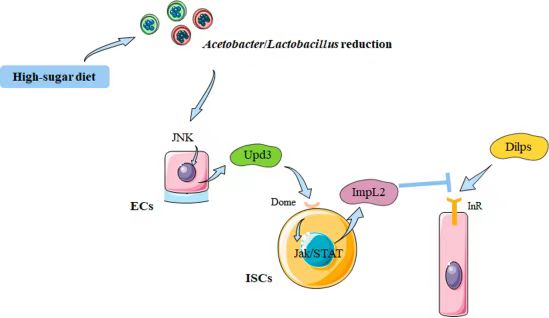Insulin resistance plays a key role in type 2 diabetes research, and a high-sugar diet is often considered one of its main triggers. Recently, Professor Wang Yiwen’s research team at the School of Pharmaceutical Science and Technology successfully used the fruit fly (Drosophila melanogaster), as a model to explore the potential role of gut microbiota in insulin resistance.
The study results showed that a high-sugar diet significantly reduced the quantity and diversity of the fruit fly’s gut microbiota, particularly the abundance of acetobacter and lactobacillus. By feeding the fruit flies with acetobacter, the research team revealed for the first time that acetobacter alleviates insulin resistance symptoms by modulating the JNK-JAK/STAT signaling pathway activity in the fruit fly’s intestine.
A high-sugar diet caused an increase in blood glucose levels in the fruit flies and significantly suppressed the activity of the insulin pathway. Supplementation with acetobacter and lactobacillus led to a significant decrease in the flies’ blood glucose levels. This phenomenon was attributed to the elevated JNK-JAK/STAT signaling pathway activity and release of the insulin receptor antagonist ImpL2 in the fruit fly’s intestine when acetobacter and lactobacillus were lacking. However, after probiotic supplementation, the activity of the JNK-JAK/STAT signaling pathway in the flies’ intestine was inhibited, reducing the release of ImpL2 and allowing the insulin pathway to be activated normally, thereby helping to lower blood glucose levels.
This study not only reveals the complex interaction mechanism between gut microbiota and the host’s insulin pathway but also provides new targets for the treatment of type 2 diabetes. It opens up new avenues for the treatment of type 2 diabetes by regulating gut microbiota. Additionally, this research provides a reliable theoretical basis for using probiotics as an adjunctive therapy strategy, paving the way for improving the effectiveness of type 2 diabetes treatment plans.
This important research has been published in the journal “BBA-Molecular Basis of Disease.” Tianjin University is listed as the first author’s affiliation, with Ph.D. student Meng Qinghao from the School of Pharmaceutical Science and Technology as the first author and Associate Professor Wang Yiwen as the corresponding author. The study received strong support and assistance from teachers at the School of Pharmacy’s Analysis Center. This discovery will undoubtedly provide important directions and insights for future research and treatment in the field of type 2 diabetes.
Link for the original paper: https://doi.org/10.1016/j.bbadis.2023.166901


